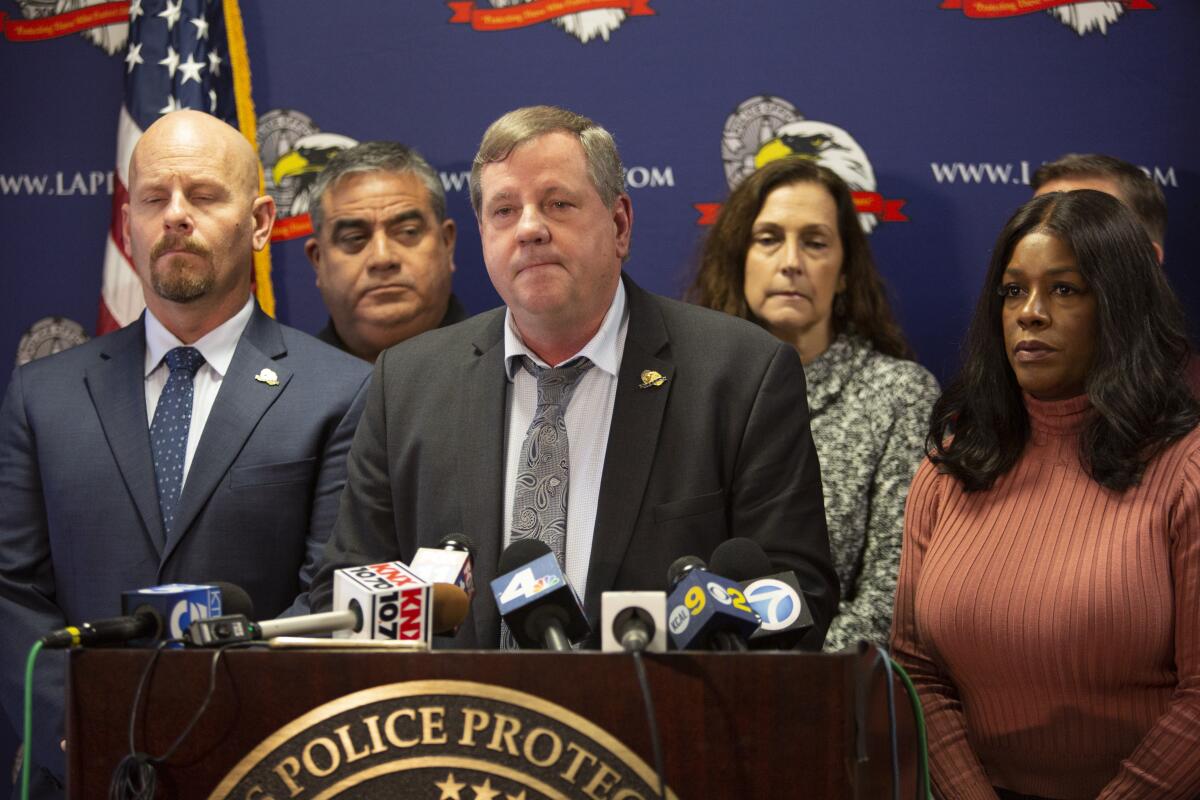Editorial: Yes, police unions pose challenges. But they remain unions

Law enforcement unions have long stood in the way of needed criminal justice reforms, especially those that would fix excessive sentences or enhance police accountability. Many of the tough-on-crime bills and ballot measures that overfilled prisons and jails in the 1980s and 1990s were bankrolled by the state prison guards’ union. The Los Angeles Police Protective League won a 2017 ballot measure that pushed back against tougher officer discipline adopted in the wake of the Rodney King beating 26 years earlier. Police unions blocked several bills in Sacramento last year, written amid protests over the killing of George Floyd, that would have enhanced police oversight. The Los Angeles Association of Deputy District Attorneys is the most outspoken opponent of reform measures put in place by its members’ boss, D.A. George Gascón.
All this law enforcement clout comes from member dues, collected and spent to support lawmakers who do the unions’ bidding — and to threaten or defeat those who don’t.
These expenditures pose a quandary of sorts for liberals, many of whom stand firm against gratuitous and destructive criminal sanctions as well as police violence while strongly supporting the labor movement and the right of all workers to organize and advocate for own interests.
No such qualms are expressed by the Los Angeles chapter of Black Lives Matter, which has organized a campaign to boot police unions out of the labor movement and even to decertify them. Police unions, chapter leaders say, promote white supremacy and perpetuate violence against Black people. And besides, they argue, police unions aren’t really unions, and have no place in the storied movement of social justice unionism.
Well, yes and no. Police reflect the racism that lives in U.S. society and, to be frank, that made a place in the private sector labor movement alongside more constructive union campaigns for racial and social equity.
Public sector workers, including police officers, began organizing in California after Gov. Ronald Reagan signed the Meyers-Milias-Brown Act in 1968, permitting city and other local government employees to collectively bargain. State workers won similar rights with the Ralph C. Dills Act, signed by Gov. Jerry Brown in 1977.
Some of us might want to wish away particular labor unions when they stand against what we view as progress on any given issue. Consider, for example, teachers unions, which are the most reliable and outspoken advocates for education funding but are currently blocking schools from reopening in many parts of the state.
But we shouldn’t get to pick and choose what labor unions are or are not acceptable. All workers ought to have a right to collectively bargain, advocate for their interests and communicate their positions to the public.
Besides, it is noteworthy that the public has defeated many recent police union-backed campaigns, such as last year’s Proposition 20 to roll back certain criminal justice reforms. Now some elected officials are rejecting police union contributions. Dealing political defeat, rather than extinction, to law enforcement unions is a more productive and principled way to fight for criminal justice reform and police accountability.
More to Read
A cure for the common opinion
Get thought-provoking perspectives with our weekly newsletter.
You may occasionally receive promotional content from the Los Angeles Times.










